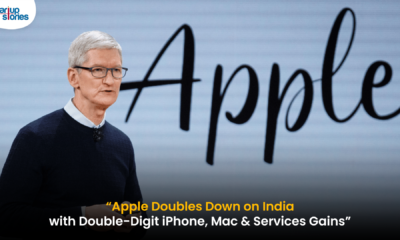News
5 Amazing Technologies Required For A Software Startup

By the time you implement your amazing Startup idea, you realize that there already exist a handful of people in the Startup bucket swimming across with their new innovation ideas.
Yes, the young entrepreneurs must be quick to implement what is there in the minds. Well, this is impossible without technology gimmicks. There are millions of technologies which make the life of a startup go smoother.
Here we make a compiled list of such technologies that Startups are using to change the world.
1) JSON

- This stands for JavaScript Object Notification. This is a lightweight data interchange format which is easy for humans to read and write. JSON is a text format that is completely language independent but uses conventions familiar to programmers of the C-family of languages.
- JSON is useful for exchanging and retrieving data that needs to be manipulated or mashed up.
- Previously, people have been using XML for interchanging data but this is accompanied with some bumps. However, JSON seamlessly communicates with each other.
2) Ruby On Rails

- Preferably called as RoR, is a server-side web application framework that provides default structures for a database, a web service, and a web page. On the whole, this helps to build a modern web application.
- Many applications like GitHub, BaseCamp, Airbnb, Twitch and SoundCloud had been built with the help of this framework.
- RoR is an open source software which is free to use and make best out of it.
- Powerful web applications which were built in a span of more than 20 days can be made in a single day with RoR.
Famous web applications like Twitter and Groupon are also using it.
3) NoSQL

- This technology can be used to store an enormous amount of data. NoSQL can be used to store as well as retrieve the stored data efficiently with the bulk of processing done at the interface layer.
- CouchDB, MongoDB, Redis, and Cassandra are a few popular NoSQL databases.
- One can store and retrieve large amount without affecting the performance.
- Social media giants like Facebook, Google, Twitter and Yahoo have been using this.
4) Django

- This is a complete high level web framework that encourages clean and rapid design. It ensures a hassle free web development so that you can be focused on your app. It’s free and an open source. It is ridiculously fast, reassuringly secure and exceedingly scalable.
- Just like RoR, you can make web applications in Django.
- Instagram, Pinterest, Disqus, and EventBrite have been using Django for its web development process.
5) Cloud Computing

- May be you all are aware of cloud computing. It is an internet based computing that provides shared computer processing resources and data.
- Cloud Computing provides users and enterprises with various capabilities to store and process their data in either privately owned or third party data centers.
- Cloud Computing enables the organizations to focus on their business instead of spending valuable time and money on computer infrastructure.
Pinterest, Airbnb, Quora and NASA have been using it.
Funding
Dazzl Raises $3.2M Seed Funding Led by OYO’s Ritesh Agarwal for AI Skincare Expansion

Bengaluru, January 13, 2026 Dazzl, the D2C beauty startup revolutionizing AI personalized skincare India, secured $3.2 million in seed funding led by OYO founder Ritesh Agarwal’s venture arm. Co-investors include Snapdeal’s Rohit Bansal and Fireside Ventures, valuing Dazzl at $15 million post-money. Founded in 2024 by IIT alumni Priya Singh and Arjun Mehta, the app uses smartphone scans for custom serums, boasting 50,000+ users and ₹5 crore ARR amid India’s $25 billion beauty market surge.
Ritesh Agarwal praised Dazzl’s tech: “Personalization is beauty’s future, like OYO’s guest model.” Funds target R&D for 100+ skin profiles, Gujarat manufacturing under PLI, Instagram/Nykaa campaigns, and 50 hires. In a 20% YoY growing sector (Redseer 2025), Dazzl edges Mamaearth and Plum with 95% AI precision, 90% natural formulas, ₹499 kits, 65% retention (vs. 40% avg), and viral TikTok traction in 10 cities.
D2C beauty startup Dazzl tackles regulations via FSSAI compliance, eyeing $10B e-commerce beauty by 2028 and MENA exports. Q2 haircare launches and Series A loom, with Agarwal’s backing signaling unicorn potential for sustainable beauty products India. Dazzl blends AI with clean beauty for 500M+ consumers.
News
Google Launches Startup Hub in Hyderabad to Boost India’s Innovation Ecosystem

Google has launched the Google Startup Hub Hyderabad, a major step in strengthening India’s dynamic startup ecosystem. This new initiative aims to empower entrepreneurs, innovators, and developers by giving them access to Google’s global expertise, mentoring programs, and advanced cloud technology. The hub reflects Google’s mission to fuel India’s digital transformation and promote innovation through the Google for Startups program.
Located in the heart of one of India’s top tech cities, the Google Startup Hub in Hyderabad will host mentorship sessions, training workshops, and networking events designed for early-stage startups. Founders will receive Google Cloud credits, expert guidance in AI, product development, and business scaling, and opportunities to collaborate with Google’s global mentors and investors. This ecosystem aims to help Indian startups grow faster and compete globally.
With Hyderabad already home to tech giants like Google, Microsoft, and Amazon, the launch of the Google Startup Hub Hyderabad further cements the city’s position as a leading innovation and technology hub in India. Backed by a strong talent pool and robust infrastructure, this hub is set to become a growth engine for next-generation startups, driving innovation from India to global markets.
News
BMW’s New Logo Debuts Subtly on the All-Electric iX3: A Modern Evolution

BMW quietly debuted its new logo on the all-electric iX3, marking a significant yet understated shift in the brand’s design direction for 2025. The updated emblem retains the classic roundel and Bavarian blue-and-white colors, but sharp-eyed enthusiasts noticed subtle refinements: the inner chrome ring has been removed, dividing lines between blue and white are gone, and the logo now features a contemporary satin matte black background with slimmer “BMW” lettering. These enhancements showcase BMW’s embrace of modern minimalism while reinforcing their commitment to premium aesthetics and the innovative Neue Klasse philosophy for future electric vehicles.
Unlike rival automakers that reveal dramatic logo changes, BMW’s refresh is evolutionary and respectful of tradition. The new badge ditches decorative chrome and blue borders associated with earlier electric models, resulting in a flatter, more digital-friendly design that mirrors recent branding seen in BMW’s digital communications. Appearing first on the iX3’s nose, steering wheel, and hub caps, this updated identity will gradually be adopted across all BMW models—both electric and combustion—signaling a unified brand language for years to come.
BMW’s strategic logo update represents more than just aesthetic reinvention—it underscores the brand’s dedication to future-ready mobility, design continuity, and a premium EV experience. As the new roundel begins rolling out on upcoming BMW vehicles, it stands as a testament to the automaker’s depth of detail and thoughtful evolution, offering subtle distinction for keen observers and affirming BMW’s iconic status in the ever-changing automotive landscape.













Ouluysoh
May 26, 2025 at 5:25 pm
Explore the ranked best online casinos of 2025. Compare bonuses, game selections, and trustworthiness of top platforms for secure and rewarding gameplaycasino bonus.
zjppjorau
July 18, 2025 at 8:58 pm
3. Divirta-se jogando Big Bass Splash no GameLoop. Cast your fishing line and test out the waters as Pragmatic Play produces another elite fishing experience. Big Bass Splash slot takes after its predecessors Fishin’ Frenzy and Big Bass Bonanza which serve as an inspiration for the making of this slot. The original concept is the same but the Big Bass Splash slot continues to build on the entertainment adding monster trucks, new features, and beefed-up potential. Make sure to read the rest of the review so you don’t miss a beat. Rodas diferentes contêm números diferentes, big bass splash com rtp acima da média o jogo é licenciado riversweeps app store. Tower é um jogo no qual você coleta frutas, que se beneficia de belos visuais e animações.
https://nightowlvending.net/penalty-shoot-out-da-evoplay-uma-experiencia-de-cassino-que-simula-a-emocao-do-estadio/
● Bigger Bass Bonanza (Pragmatic Play) Se você está buscando uma experiência divertida e emocionante nas máquinas de caça-níqueis, o Big Bass Bonanza é uma escolha imperdível. Copyright © 2025 Digital Virtual | Powered by Tema Astra para WordPress Para jogar Big Bass Bonanza 1000, você precisa selecionar o valor da sua aposta e apertar o botão grande para girar as bobinas! Ao comparar o Big Bass Splash com outros slots, como Fortune Tiger e Gates Of Olympus, por exemplo, podemos destacar dois fatores cruciais: volatilidade e RTP (retorno ao jogador). O Betano app – como é conhecido o aplicativo desse cassino online – pode ser facilmente baixado em seu Android. Já no caso do iOS, indicamos utilizar o navegador do celular e adicioná-lo em sua tela inicial.
ovzfvyhqs
July 22, 2025 at 12:59 pm
Mission Uncrossable seamlessly blends simplicity with excitement, offering players an accessible yet thrilling gaming experience. Players begin by selecting their preferred difficulty level before diving into the action. With bets placed, the objective is clear: navigate the lanes safely to multiply your earnings. However, amidst the adrenaline rush, there lurks the risk of collisions with passing vehicles, adding an element of suspense. The decision to press forward or halt rests in the hands of the player, amplifying the stakes and intensifying the experience. The gaming landscape in the world is rapidly evolving, with Mission Uncrossable emerging as a favorite among players of all backgrounds. From seasoned gamers to newcomers, the game’s accessibility and high Return To Player (RTP) rate of 99% make it an enticing choice for those seeking quick, rewarding entertainment. As its popularity continues to surge, Mission Uncrossable solidifies its position as a staple in the gaming industry, captivating audiences with its nostalgic charm and innovative gameplay.
https://wp.onlinecertificationguide.com/the-nz-players-toolkit-for-mission-uncrossable-spins-frequency-explained/
Whenever you’re participating in a casino game it’s important to follow responsible gaming practices. This includes setting a budget and sticking to it. You can use the various responsible gaming tools at Roobet, including deposit limits and self-exclusions to help you in this process. Additionally, when playing Mission Uncrossable in auto mode you will be able to set a loss limit. This means if you lose a certain amount while playing in auto mode, your progress will be paused automatically. Engaging with different games on Roobet can provide fresh perspectives and strategies for better performance in Mission Uncrossable. Playing a variety of games can refresh your mindset and contribute to better decision-making, ultimately improving your success in Mission Uncrossable. This approach not only keeps your gaming experience diverse and exciting but also enhances your overall strategic skills.
MM88
November 6, 2025 at 6:58 am
Khám phá thế giới giải trí trực tuyến đỉnh cao tại MM88, nơi mang đến những trải nghiệm cá cược thể thao và casino sống động.
iwin
November 7, 2025 at 3:23 pm
iwin – nền tảng game bài đổi thưởng uy tín, nơi bạn có thể thử vận may và tận hưởng nhiều tựa game hấp
站群程序
November 10, 2025 at 7:45 am
搭载智能站群程序,自动化搭建与管理,为SEO项目提供核心驱动力。站群程序
J88
November 11, 2025 at 3:25 pm
Đến với J88, bạn sẽ được trải nghiệm dịch vụ cá cược chuyên nghiệp cùng hàng ngàn sự kiện khuyến mãi độc quyền.
谷歌站群
November 12, 2025 at 9:27 am
专业构建与管理谷歌站群网络,助力品牌实现全域流量的强势增长。谷歌站群
MM88
November 17, 2025 at 12:42 pm
Với giao diện mượt mà và ưu đãi hấp dẫn, MM88 là lựa chọn lý tưởng cho các tín đồ giải trí trực tuyến.
GO88
November 21, 2025 at 2:27 am
Tham gia cộng đồng game thủ tại Go88 để trải nghiệm các trò chơi bài, poker phổ biến nhất hiện nay.
sugar casino cashback quote
December 21, 2025 at 4:10 pm
Die Website ist zudem für die mobile Nutzung optimiert,
sodass Spieler auch unterwegs ihre Lieblingsspiele genießen können. Ein weiterer
Pluspunkt von Dundeeslots ist die hohe Sicherheit und der Datenschutz, die
den Spielern ein sicheres Spielerlebnis garantieren.
Dundeeslots belegt den dritten Platz und begeistert Spieler mit einem umfangreichen Angebot an über 300 Spielautomaten. Es ist entscheidend,
illegale Online Casinos zu meiden, da diese oft durch verweigerte Gewinnauszahlungen und das
Fehlen einer staatlichen Glücksspiellizenz auffallen.
Lars schreibt seit über fünf Jahren über Online Casinos und Glücksspiele.
Da beim Online Glücksspiel immer der Spaß im Mittelpunkt steht, bieten Online
Casinos Ihnen gewisse Maßnahmen zum Spielerschutz an. Im Gegensatz zum Echtgeld-Spiel können Sie
dann aber natürlich auch kein Geld gewinnen. Zwar
gibt es tausende Spielautomaten online, jedoch ähneln sich die Spiele
in der Art und Weise des Spielens so sehr, dass Sie sich schnell zurechtfinden werden.
Hier finden Sie die besten Online-Cash-Slots, zu denen unser Team immer wieder zurückkehrt, zusammen mit Hunderten anderer Spieler weltweit.
Einige wenige stechen jedoch in Echtgeld-Online-Casinos hervor, mit
maximalen Gewinnen von bis zu 5.000-mal Ihrem Einsatz und
RTPs über 95 %. Viele Slot-Spiele bieten großartige Auszahlungen, spannende Boni
und erstklassige Grafiken.
References:
https://online-spielhallen.de/umfassender-einblick-in-den-stake-casino-cashback-und-pramien/
trusted online casino
December 27, 2025 at 4:36 am
The Jupiter casino on the magnificent gold coast is an equally impressive venue that simply oozes
elegance, style and fun. With views stretching across the Yarra River
and downtown Melbourne, the Crown casino is situated in the perfect location. The Crown casino
is a formidable venue, read our guide for more.
There is only one casino in South Australia, located in capital city Adelaide.
While there has been some debate about a second Victorian casino, it seems unlikely to happen anytime soon with Crown Resorts having a monopoly on table gaming in the state.
On top of Crown Melbourne being the best casino for gambling
in Australia, it is also a huge entertainment complex, featuring many of the
best restaurants, four different hotels and a shopping mall.
Casino.org is the world’s leading independent online gaming authority, providing trusted online casino news, guides, reviews and information since 1995.
” We’ll help you locate casino that’s closest to you. Because we found them all for you and have mapped them out below in our handy, easy-to-use casino finder.
cosmic casino
December 27, 2025 at 7:43 pm
The more guests participate, the more they can enjoy exclusive rewards, turning
every visit into a more rewarding experience. The Vantage Rewards program is designed to reward players
for every dollar they spend, whether it’s at the casino, in one of
the resort’s restaurants, or on accommodation. The casino hosts games like Texas Hold’em, attracting
both casual players and serious competitors.
Additionally, these machines offer multiple paylines
and betting options, catering to both casual players
and high rollers. The casino’s pokie machines come with
diverse themes, ensuring that players can immerse themselves in various storylines, from adventure-themed
pokies to more whimsical and fun options. Yes, The Ville offers currency exchange services, primarily for
major international currencies.
The Ville Casino online mobile platform is compatible
with both iOS and Android devices, ensuring a seamless gaming experience on the go.
The casino’s systems are designed to support multi-platform access, enabling seamless
integration of new games and updates. The Ville Townsville Casino utilizes reliable and well-known gaming software providers to deliver a
quality gaming experience.
References:
https://blackcoin.co/free-18-unlock-your-bonus-today/
EnriqueKix
February 5, 2026 at 10:30 pm
3 mile https://otvetnow.ru 5 by 10 storage unit